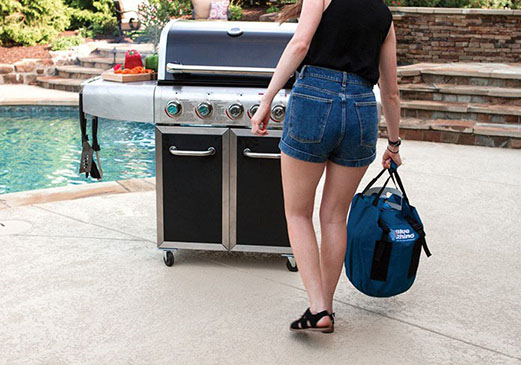Is propane flammable?
It might seem counter-intuitive to ask the question “Is propane flammable?” But the answer to that seemingly simple question is more complex and reveals important details about liquid propane gas and propane fumes, and the distinct differences between them.
Flammability: Liquid propane vs. propane gas
The short answer, yes propane is flammable. The first element to consider is a matter of state. Under pressure, and in its liquid state, commonly referred to as LPG, propane is not flammable. Only when the fuel is released and converted to a propane gas will it become combustible.
At temperatures above -44 degrees Fahrenheit, propane will begin to “boil” as it moves from a liquid state to a gaseous state. When propane gas is routed to the ignition sources of appliances, heaters, and grills, continuous combustion occurs - giving you steady, reliable, and controllable heat.
How contact with air can cause propane to be flammable
Another issue to consider in terms of propane’s flammability is the ratio, or mix, of propane and atmospheric air. Between 2.15 and 9.6% propane/air mixture is required for propane to be combustible.
Lower or higher percentages will prevent combustion, and improper air/gas mixture ratios can lead to the production of unhealthy carbon monoxide gas, which results from incomplete combustion. When the propane and air mixture is maintained at ideal levels, propane is one of the safest and cleanest burning fuels available.
Additionally, like other fuels, propane possesses other properties related to flammability that can give consumers the knowledge needed to understand propane and its uses.
- The Flash Point of propane is -156 degrees Fahrenheit. This is the temperature at which already ignited propane will continue to burn on its own. If the temperature drops to -157 degrees, propane will extinguish itself - unless there’s a continuous source of ignition present.
- Atmospheric Ignition Temperature - Between 920 and 1020 degrees Fahrenheit is the temperature at which propane is capable of ignition without an ignition source. For comparison, gasoline has an ignition temperature between 80 and 300 degrees.
- Maximum Flame Temperature - Propane reaches its upper-temperature limit at 3,595 degrees Fahrenheit.
- Propane Octane Number - Propane has an octane rating of between 104 and 112, which makes it an efficient fuel for internal combustion engines that are designed for propane usage. Octane ratings are based on the breakdown of hydrocarbon chains in a fuel. Generally, a higher octane rating is an indication of improved performance and efficiency.
NFPA continues to classify propane as a stable fuel source
The chemical composition of propane makes it both an effective and stable fuel for home, industrial, and automotive use. In fact the National Fire Protection Association (NFPA) rates propane as a “0” for risk of instability. The NFPA rating of 4 on flammability indicates that propane burns readily, and as such, requires cautions in handling in use - such as prohibiting smoking or open flames in storage areas. While specific conditions must be present for propane to ignite, it’s important for users to be aware of their environment when using propane.
Propane’s narrow range of flammability, and its much higher ignition temperature, makes it a safe fuel for consumer applications. This stability, combined with more than 100 years of safety engineering, propane is one of the safest and widely used fuels in North America. Propane tanks are puncture resistant - more than 20 times resilient than tanks that hold gasoline, methanol, and ethanol. Additionally, since propane is stored under pressure in liquid form, storage tanks are engineered to hold up for years, even under extreme conditions.

Tips to avoid propane combustion or explosion
On its own, propane isn’t explosive - requiring external ignition sources to ignite the gas. Nevertheless, there are safety measures that can help provide additional levels of protection against accidental combustion or explosion.
- Keep your tank away from ignition sources. When not in use, be sure to turn off the valve to your supply lines, and be aware of any odors that could indicate a leak.
- Check for leaks. It’s a good practice to check for leaks with every new tank of propane. This can be done with a simple soap and water solution, wiped onto tank fittings and supply lines. Bubbles emerging from the system indicate a leak - and you’ll want to turn off the supply valve and call your nearest Ferrellgas dealer for advice.
- Store your tank properly. Always store your propane tanks outdoors, out of direct sunlight and in well-ventilated areas. It’s likewise best to keep the tank in an upright position.
- Transport your tank safely. When transporting propane tanks, secure the tank in an upright position. Avoid the use of chains or metal fasteners that could damage the tank. Open a window near the tank to ensure proper ventilation in the event of a leak.
Contact Ferrellgas for any propane safety questions or concerns
Understanding more about the properties of propane, as well as the safety measures you can install in your home or business, can give you the confidence to safely enjoy the unparalleled benefits of propane. If you ever have questions or want to learn more about propane and its uses, be sure to reach out to your local Ferrellgas dealer.
CATEGORIES
Archives
- Summer 2025
- Spring 2025
- Winter 2024
- Fall 2024
- Summer 2024
- Spring 2024
- Winter 2023
- Fall 2023
- Summer 2023
- Spring 2023
- Winter 2022
- Fall 2022
- Summer 2022
- Spring 2022
- Winter 2021
- Fall 2021
- Summer 2021
- Spring 2021
- Winter 2020
- Fall 2020
- Summer 2020
- Spring 2020
- Winter 2019
- Fall 2019
- Summer 2019
- Spring 2019
- Winter 2018
- Fall 2018
- Summer 2018
- Spring 2018
- Winter 2017
